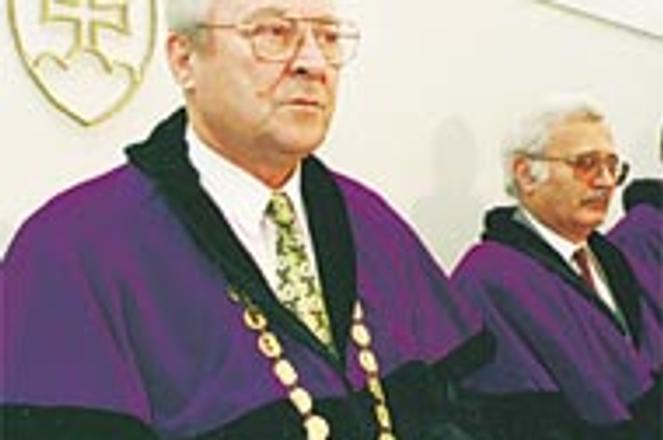Back to the drawing board. Constitutional Court chief justice Milan Čič knocks wind out of municipal elections with Oct. 15 decision.TASR
Nation-wide municipal elections, originally set for November 13-14, may have to be delayed up to eight months due to inconsistencies in the new municipal election law.
According to an October 15 decision handed down by the Constitutional Court, the July 1998 municipal election law amendment muscled through parliament by the outgoing government of Premier Vladimír Mečiar contained six provisions that contradicted the Slovak Constitution.
Deputies from the former opposition parties, which won a healthy majority in September elections, are now trying to decide whether to scrap the new law altogether, or delay elections and make the necessary changes. But all agree that elections cannot go ahead as planned.
"Each alternative requires the same thing - that the election process be returned to a point before the submission of candidate lists," said Ivan Šimko, a legal expert with the largest party of the former opposition, the Slovak Democratic Coalition (SDK).
"Elections cannot take place on the appointed date in compliance with the current legislation," agreed Eduard Barány, Director of the State and Law Department at the Slovak Academy of Science. Barány was appointed head of the central election commission for municipal elections on October 19.
The Constitutional Court cited six points in which the law contravened the Slovak Constitution. Two of the biggest objections concerned a provision that favoured candidates of a certain race or nationality, and a clause that set the length of time that mayoral candidates had to be permanent residents of their municipalities. The law was appealed by a group of opposition deputies on August 7.
Šimko explained that one way to secure valid elections was to postpone the election date until the new Parliament approved a new (and legal) amendment to the election law. "The next Parliament will have to amend the constitution and then pass a law delaying the date of elections. It would also have to prolong the terms in office for incumbent local representatives," Šimko said.
"The problem here is that someone has to rule in the municipalities," agreed Barány, but warned that a prolonged run-up to municipal elections couild lead to serious neglect of local problems. "[Such neglect by campaigning politicians] is typical for the pre-election period, but in this case it might take up to six or eight months," Barány said.
Barány argued, moreover, that changing the constitution to allow postponement of the elections might set "a dangerous political precedent. Four or eight years from now, it might allow future Parliamentary deputies to prolong their mandates up to 15 years," he added.
For Šimko, the only workable alternative to amending the constitution was declaring the new law invalid and holding elections under the terms of the previous version. "This would be more fair to the mayors and other officials who had already been preparing themselves for elections before the amendment was approved on July 1," Šimko suggested, adding that Slovaks were comfortable with the old law. "Elections have been held twice under [the previous] law," he said.
The parties of the former opposition accused the Mečiar government of deliberately stalling to prevent the municipal election chaos from being straightened out. The earliest date a new government can be formed is October 29, the last possible day for holding the first session of the new national Parliament. "We called on the government to act and make the elections constitutional, because they are responsible for this situation," said Šimko.
Mečiar, for his part, said that the municipal question was Parliament's problem. "But there are no [governmental and Parliamentary] bodies established yet, there is just political will and that is not much," Mečiar told the October 19 foundation session of the central election committee.


